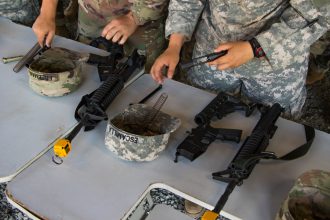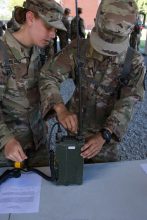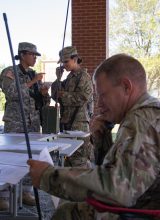
Cadets are tasked to take apart and then reassemble their rifles as part of the Individual Task Test at Fort Knox, Ky. July 13, 2019. | Photo by Jacob Hempen, CST Public Affairs Office
FORT KNOX, Ky. — 2nd Regiment Basic Camp Cadets were brought to the Individual Task Test (ITT) to check their rifle maintenance, basic land navigation skills, radio call procedures and other basic soldiering skills.
The ITT evaluates Cadets in many different areas, but it’s the third skill that has Cadets especially nervous.
What are these radio call procedures, or the 9-line medical evacuation call? And why does it have Cadets nervous going into the test?
The 9-line is a term that refers to a call made for medical evacuations in the field. Due to the serious nature of the call, Cadets, as well as other Army personnel, are expected to make these calls with perfect clarity and precision.

Cadets go through the process of using their radios to call in medical evacuation as part of the Individual Task Test at Fort Knox, Ky. July 13, 2019. | Photo by Jacob Hempen, CST Public Affairs Office
Hannah Orland, a Mount St. Mary’s University Cadet, spoke on this precision and why it’s the little things that make such a big difference.
“It’s so long and it’s so defined in how they want it done,” the Frederick, Maryland, native said. “If you mess up one little thing then the whole thing is ruined. Like if you mess up one little grid coordinate, they aren’t going to know the correct space, or if you mess up your signaling, like if you’re using smoke or paneling and you say the wrong one, then they are going to be looking for the wrong thing. So if you mess up one small thing, someone’s life is at risk.”
The content of the call is not the only thing that Cadets have to keep track of, as another Cadet would point out.
Cadet Aaron Abshire, a Waldorf, Maryland, native, said that he was nervous about 9-line because of the vocabulary used during these calls.
“I’m a little iffy on the radio procedures because there are certain ways you have to key up,” the University of Maryland Cadet said. “So when you key up you have to say who you are keying up to and what your call sign is. There is just certain vocabulary that is essential for radio communication. Like you can’t just speak normally, there are certain words you have to say.”

Cadets test the radio by calling the Cadre and speaking the proper phrases to call in a medical evacuation during the Individual Task Test at Fort Knox, Ky. July 13, 2019. | Photo by Jacob Hempen, CST Public Affairs Office
Both of these expectations for call procedure are reasons to take this part of the test very seriously. One Cadet hones in on what makes these calls a big deal in a short and sweet manner.
Cadet Sofia Lares, from the University of Texas San Marcos, gave her take on the 9-line call.
“The only thing that I would say is a little hard to learn, and I think it is for everyone, is nine line,” the San Antonio, Texas, native said. “You have to be precise because in the real world it’s somebody’s life on the line if you don’t do something correctly.”
At the end of the day, one must not forget why these calls are made. Each Cadet knows it and this training makes sure when they reach the field they will be able to pick up the radio and make that call.




